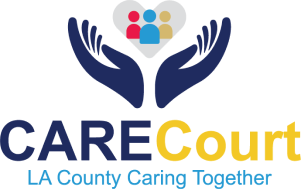The process begins with a family member, first responder, or other qualified individuals/entities
filing a petition to begin the process of assessing the individual's eligibility for CARE Court. A
judicial officer will determine whether an individual is eligible.
Upon acceptance of the petition, the individual is assigned an attorney who will represent them
through the entire process. The individual will also be contacted by the Los Angeles County Department
of Mental Health (LACDMH) to assist in identifying the participant's needs and assist in the
development of a CARE Agreement or Care Plan, if appropriate.
The CARE Agreement or CARE Plan may include offers of community-based mental health resources and
housing. Under both, individuals can receive services for approximately one year, up to a maximum of
two years. Review hearings will be scheduled periodically to assess the individual's progress and
monitor accountability of service providers.
